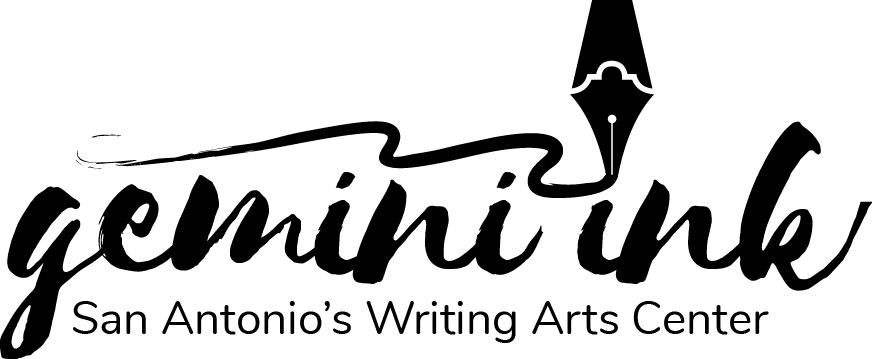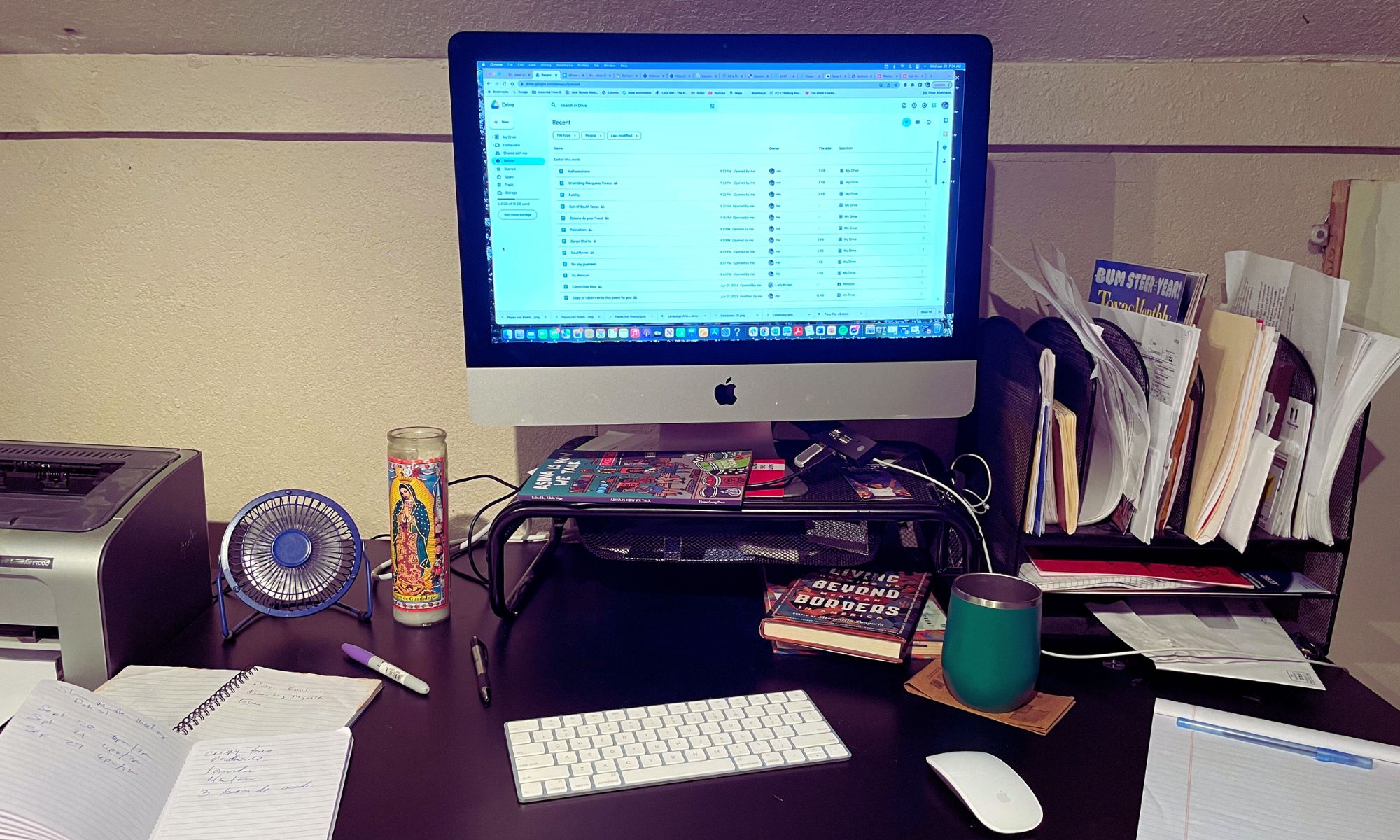The Writer’s Desk features the desks and writing practices of Gemini Ink faculty, visiting authors, teaching artists, volunteers, students, interns, staff, partners and more. Receive new posts in your inbox by subscribing to our newsletter at bit.ly/geminiinknewsletter.
Join Andrew Porter on Tuesdays, Aug 1 & 8, 6:30-8:30pm CST, Hybrid (via Zoom and in-person at Gemini Ink), for his workshop: Generative Flash Fiction. In this introductory workshop, participants will study different types of flash fiction, discuss effective strategies for working within the constraints of this form, and complete in-class writing prompts with the goal of developing these exercises into more polished flash pieces
Hi Andrew, thanks for taking the time to answer some of these questions for our Writer’s Desk feature!
- Has your preferred place to write changed over the years?
Yes, definitely. It took me a long time to figure out what types of things were most important to me in terms of a writing environment. For years, I worked in dark, cramped spaces, noisy apartments, and crowded coffee shops. I didn’t realize how sensitive I was to noise or to the physical space around me. In fact, it was only somewhat recently, during the early days of the pandemic, when I was forced to set up a make-shift writing desk in my bedroom, that I realized how much better I felt writing in a space that had certain qualities: high ceilings, quietness, a lot of natural light, windows looking out onto nature. This has been by far my most productive writing space, and I only wish I’d recognized at an earlier time in my life how important these elements were to me.
- Do you have any habits or routines that you follow before writing?
Well, I suppose the two constants in my pre-writing routine have always been coffee and reading. I’ll usually sit down with a big cup of coffee and read for about twenty minutes before I start writing.
I find it pretty difficult to just switch gears from, say, doing the dishes or answering an email to writing fiction. I need a transitional period, and reading is one of the easiest ways for me to transition into that other, more creative type of mindset. And, of course, the coffee helps a lot, too.
- How important is it to you to have stability in your writing routine?
I think it’s pretty important when I’m working on a longer project, like a novel, but not as important when I’m working on short stories. With two young children at home, I’ve really had to adjust my writing routine in recent years. To be honest, the ability to keep a regular schedule—to write at the same time each day for roughly the same amount of time—seems like a luxury to me at this time in my life. So, partly out of necessity, I’ve really had to embrace a more irregular way of working, writing as much as I can in whatever small windows present themselves.
-
- What’s a book or movie that you can watch over and over again and not get tired of?
Wim Wenders’s Paris, Texas. I probably watch that film at least once a year. I just love the atmosphere of it, the quietness of it, and the gorgeous cinematography.
-
-
- What is your favorite podcast and why? Why is it your favorite?
-
I love a lot of literary podcasts—too many to pick just one —but my favorite “non-literary” podcast is You’re Wrong About, a podcast about pop culture in which the hosts revisit, in their words, “a person or event that’s been miscast in the public imagination.” It’s a great concept for a show, and the show’s main host, Sarah Marshall, is brilliant and hilarious.
-
-
- What theme or symbol often emerges in your work? Why are you drawn to this theme/symbol?
-
The theme of disappearance is obviously prominent in my latest collection, The Disappeared, but it’s also a major theme in my first two books. The opening story of my first collection begins with the lines: The hole was at the end of Tal Walker’s driveway. It’s paved over now. But twelve summers ago Tal climbed into it and never came up again. So, in a sense, this theme of disappearance has been with me from the start.
-
-
- Who are your favorite writers? And who is your favorite hero/heroine in fiction?
-
I don’t know that I have a favorite hero/heroine, but some of my favorite writers include Kirstin Valdez Quade, Sara Majka, Alexander Chee, Maile Meloy, Denis Johnson, Rachel Cusk, Sheila Heti, Marilynne Robinson, Elena Ferrante, Sigrid Nunez, and Annie Ernaux.
-
-
- What are some misconceptions about being a writer that you can discredit?
-
One of the biggest misconceptions about being a writer is that the challenges of the writing life—that is to say, the bouts of discouragement and self doubt and frustration—go away over time or that the writing life itself gets easier the longer you’re immersed in it, or once you’ve published a certain amount.
Perhaps one becomes more accepting of what the life is like, or more numb to the difficult parts, but I don’t know that it ever gets easier. With that said, if you devote yourself to it fully, the delights of this life remain as well, and often they even increase, so that’s the good news!
-
-
- Does good writing result from best practices, magic, or a bit of both?
-
I think it’s a bit of both. I’m sure some writers would disagree, but I definitely believe there’s a magical aspect to it. Call it inspiration, or an aligning of the stars, whatever you want, but I know that most of my stories came about because I happened to be sitting down to write on a particular day and because a certain image entered my head at a certain moment, and that image then led me to write down a certain sentence, and so on. In other words, had I not sat down to write on that particular day, that particular story might never have happened. At the same time, after that initial inspiration puts the story in front of you in whatever strange form it might take, you need to have the discipline to shape and revise and turn it into something a reader would want to spend time with.
-
-
- If people want to learn more about your work, where should they go?
My website: www.andrewporterwriter.com
- If people want to learn more about your work, where should they go?
-

ANDREW PORTER is the acclaimed, award-winning author of the story collections The Disappeared (Knopf 2023) and The Theory of Light and Matter (Vintage), and the novel In Between Days (Knopf). An Iowa Writers’ Workshop graduate, he has received a Pushcart Prize, a James Michener/Copernicus Fellowship, and the Flannery O’Connor Award for Short Fiction. His work has appeared in One Story, The Threepenny Review, Ploughshares, Narrative, The Southern Review, and on Public Radio’s Selected Shorts. Currently, he teaches fiction writing and directs the creative writing program at Trinity University in San Antonio, Texas.



